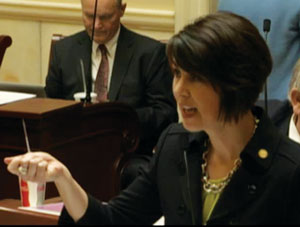The AOA is sending out a rallying cry to all state optometric associations and optometrists to combat a set of 1-800-Contacts backed legislative bills that would ban unilateral pricing policies (UPP) for contact lenses.
“Although there are 14 states that are being immediately targeted by 1-800-Contacts, it’s really an attack on our profession and the essential care we provide to our patients,” says AOA president David A. Cockrell, OD. “The AOA and state associations have mobilized quickly to fight back, but we need every optometrist and optometry student to get involved and help get our message out to legislators and to the public.”
Bills are currently pending or in the works in Arizona, California, Florida, Idaho, Illinois, Louisiana, Minnesota, Mississippi, New York, Oregon, Rhode Island, Tennessee, Utah and Washington, according to the AOA.
At press time, an anti-UPP bill in Mississippi has already died in the legislature, a bill in Idaho has been approved in committee, and a bill in Utah—the home state of 1-800-Contacts—has been approved by the state Senate and introduced into the state House of Representatives.
|
|

|
|
|
Sen. Deidre M. Henderson called for a vote in the Utah Senate in favor of a bill that bans unilateral pricing policies in the state. She acknowledged that the American Optometric Association was opposed to the bill. The vote passed 21 to 8 in the Senate and, at press time, was introduced to the Utah House.
|
Officials from 1-800-Contacts told Congress last July that the decision made by contact lens manufacturers to set price minimums on specific brands of their contacts would raise prices for consumers and prohibit consumers’ ability to “shop around” for their contact lenses.
Now, the AOA says optometrists are being placed in the middle of a fight between contact lens manufacturers and online retailers such as 1-800-Contacts. “The AOA believes that the announced goal of blocking unilateral pricing polices is part of a larger effort to misrepresent how ODs provide care for patients and, ultimately, to prohibit patients from obtaining contact lenses from community-based practices of independent eye doctors,” the AOA state government relations committee wrote in a memo to its state affiliates.
The AOA says optometrists should defend against 1-800’s allegations by bringing the following key points to the attention of their state legislators as well as concerned doctors and patients:
- Contact lenses are medical devices and optometrists need to be involved in patient use. Any review of the scientific literature or even the lay press confirms the fact that a patient’s vision and overall health are at risk with improper contact lens wear, care or fit.
- Doctors recommend specific lenses for medical and safety reasons. Substitution of a prescribed medical device like a contact lens is wrong and poses unintended health risks to the patient.
- More needs to be done to target unscrupulous contact lens sellers and profiteers. The legislature should empower the state optometry board with the tools it needs to target contact lens sellers who threaten public health and hold them accountable for the harm they cause.
Sen. Deidre M. Henderson, who introduced the anti-UPP legislation in Utah, acknowledged to the state Senate that, “The American Optometric Association does not like this bill … But their arguments that this bill will weaken the quality of eye health care standards and undermine the doctor-patient relationship doesn’t make any sense to me.”
She added, “[This bill] does not in any way change or hinder [optometrists’] ability to care for their patients at all.”
|
Contact Lens Pricing Bills by State
Where do these pending anti-UPP bills stand? Here’s a roundup from the AOA, as of March 24th: | |
Arizona
Florida
Idaho
Illinois
Mississippi
|
New York
Oregon
Rhode Island
Utah
Washington
|
| Meanwhile, bills in California, Louisiana, Minnesota and Tennessee are expected to be introduced in those legislatures soon. | |

